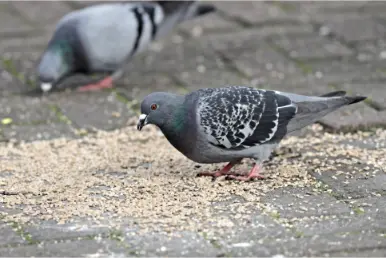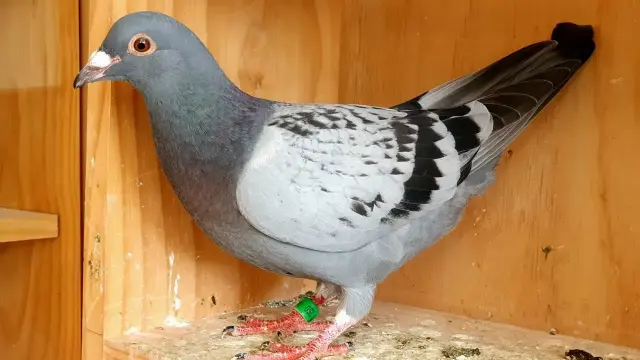Why Do Pigeons Throw Up?
This post contains affiliate links. As an Amazon Associate, we earn from qualifying purchases.
Pigeons are known for their habit of throwing up, often without warning, and it can be a puzzling and frustrating experience for those who witness it. Many people wonder why pigeons exhibit this behavior and what causes them to throw up. Understanding the reasons behind this phenomenon can provide insight into the behavior of these common urban birds.
Reasons for Pigeon Vomiting:
- 1. Infections
- 2. Diseases
- 3. Nutritional or Dietary Issues
- 4. Physical or Psychological Stress
- 5. Toxicities
- 6. Gastrointestinal Disease or Compression

Reasons Why Pigeons Throw Up
It is important for pigeon owners to be aware of the potential causes of vomiting in their birds. Vomiting in pigeons can be caused by various factors, including infections, diseases, nutritional issues, physical or psychological stress, toxicities, and gastrointestinal diseases or compression.
1. Infections
Parasitic, bacterial, or fungal infections can lead to vomiting in pigeons. Common infections include canker, coccidiosis, and adenovirus. Gram-negative organisms are often the culprits behind these infections.
2. Diseases
Heart, liver, or kidney disease, diabetes, gastrointestinal disease or blockage, peritonitis, electrolyte imbalances, and trauma can all cause vomiting in pigeons. Trauma, such as bites from other animals, can result in internal bleeding or infections.
3. Nutritional or Dietary Issues
Overfeeding, motion sickness, excessive protein intake, and imbalances of vitamins A, D, E, or iron can contribute to vomiting in pigeons. Younger pigeons may be more sensitive to the temperature, consistency, and amount of food given.
4. Physical or Psychological Stress
Changes in the environment, people, atmosphere, or weather can stress pigeons and lead to vomiting or other health issues. Altered behavior towards other birds, mirrors, or even owners can also be a common cause.
5. Toxicities
Lead ingestion is a frequent cause of toxicity in pigeons. Heavy metals like zinc, arsenic, and lead are toxic to them. Certain foods, such as nicotine, chocolate, salt, and avocado, can also be problematic. Pesticide consumption, such as lindane, organophosphate, and rotenone, can have toxic effects as well.
6. Gastrointestinal Disease or Compression
Chest or abdomen conditions that exert pressure on the digestive system can result in vomiting. Examples include goiter, crop conditions, egg binding, aerophagia, esophageal stricture, and neoplastic conditions like papilloma and leiomyoma.
Recognizing these potential causes can help pigeon owners identify the underlying issues and seek appropriate medical treatment for their birds.
How Do You Identify If a Pigeon is Vomiting
Recognizing the signs of vomiting in a pigeon is essential for their well-being. Here are some common indicators to look out for:
1. Visible Vomiting
The presence of vomit on the pigeon’s body or in the surrounding area is a clear sign of vomiting. This can indicate that the pigeon is experiencing digestive issues or illness.
2. Regurgitation
Pigeons may regurgitate food or water, which can resemble vomiting. However, it is important to note that regurgitation is a natural behavior for pigeons, especially when feeding their young ones. It may not always indicate illness.
3. Lack of Appetite
If a pigeon shows a sudden disinterest in food or refuses to eat, it could be a possible symptom of vomiting or other underlying health problems. It is crucial to monitor their eating habits and seek veterinary attention if necessary.
4. Lethargy
Vomiting can lead to dehydration and weakness in pigeons, resulting in lethargy. If you notice that your pigeon is unusually inactive, weak, or lacking energy, it could be a sign of vomiting.
5. Breathing Difficulties
Vomiting can cause dehydration and weakness, which may result in difficulty breathing for pigeons. Rapid or labored breathing could indicate underlying health issues and should be addressed promptly.
If you observe any of these signs in your pigeon, it is important to seek professional advice from a veterinarian experienced in avian care. Prompt treatment and care can help ensure the well-being and recovery of your bird.

What are the Treatment Options for Pigeons’ Vomiting
If you notice your pigeon vomiting, it is essential to take immediate action to promote its recovery.
1. Addressing the Underlying Cause
Determine the cause of the vomiting, which can range from viral diseases to parasites. Depending on the underlying cause, your pigeon may require antibiotics, antiviral agents, deworming, or anti-parasitic treatments. Consult with a veterinarian for proper diagnosis and treatment.
2. Rehydration
Vomiting can lead to dehydration in pigeons. Ensure that your pigeon has access to plenty of clean water and offer electrolyte solutions to restore lost fluids and nutrients. You can also administer fluids directly into the pigeon’s crop using a needleless syringe under the guidance of a veterinarian.
3. Rest
During the recovery period, provide your pigeon with a warm and quiet environment. Ensure they have plenty of clean and fresh bedding to promote rest and minimize stress.
4. Nutritious Diet
Feed your pigeon a nutritious diet to support its recovery. Offer high-quality pigeon feed that is appropriate for their nutritional needs. Additionally, include fresh fruits and vegetables in their diet to provide essential vitamins and minerals. Avoid feeding them foods that are high in fat or sugar, as it may further upset their stomach.
By taking these steps, you can help your pigeon recover from vomiting and ensure its overall well-being. If the vomiting persists or you notice other concerning symptoms, it is advisable to consult a veterinarian for further guidance.

How Can You Prevent Pigeon Vomiting Sickness
To prevent pigeons from vomiting, it is important to take a proactive approach. Here are some measures you can take:
1. Cleanliness
Keeping the pigeons and their surroundings clean is crucial. Regularly clean bird feeders and water containers to prevent the buildup of mold, fungi, and bacteria. This will help maintain the pigeons’ health and reduce the chances of vomiting.
2. Proper Nutrition
Pigeons need a balanced diet that provides all the necessary nutrients. Offer a variety of grains, seeds, and vegetables to ensure they receive a complete diet. Avoid feeding them spoiled or contaminated food, as this can lead to vomiting.
3. Hygiene
Maintaining good hygiene practices is essential for preventing the spread of disease. Avoid overcrowding the pigeons and ensure they have adequate spacing between them. This helps prevent the spread of illness and reduces the chances of vomiting.
4. Pest Control
Pigeons are prone to parasites such as mites, lice, and fleas, particularly in urban areas. Conduct regular inspections for signs of infestation and promptly address the issue with appropriate control measures. This helps mitigate the risks associated with pest infestations and promotes a healthier environment for both humans and animals.
By following these measures, you can reduce the likelihood of pigeons vomiting and create a healthier environment for these birds.
FAQs
Pigeons have a digestive system that includes a crop, which is a pouch in their throat where food is stored before it moves to the stomach. Pigeons may regurgitate their food, known as “throwing up” to feed their young or as a way to communicate within their flock.
Yes, regurgitation is a normal behavior for pigeons. It is a way for them to feed their offspring and is also used in courtship and pair bonding.
The act of regurgitation itself is not necessarily harmful to the pigeons. However, it is important to ensure that the pigeons are consuming a balanced diet and are not regurgitating excessively due to stress or illness.
Pigeons may regurgitate when they are unwell, as it can be a response to stress or illness. If a pigeon is showing signs of sickness, such as lack of appetite or other abnormal behaviors, it is important to seek veterinary care.
Regurgitation in pigeons is a normal and intentional behavior, while vomiting is a sign of illness. If you observe a pigeon repeatedly regurgitating or showing other signs of illness, it is important to seek professional care.
Providing a balanced diet, reducing stress, and maintaining a clean and safe environment can help minimize excessive regurgitation in pigeons.
Pigeons are known for eating a wide variety of items, and they may attempt to eat vomit. Their robust digestive systems and immune systems allow them to consume things that other animals cannot. However, it is important to note that vomit often contains partially digested food, which may be a reason why pigeons are attracted to it.
Conclusion
In conclusion, pigeons throwing up is a natural and necessary behavior for their survival. It allows them to expel indigestible substances and control their food intake. While it may seem unpleasant to humans, it is an essential part of the pigeon’s digestive process. Understanding why pigeons throw up can help us better appreciate and coexist with these urban birds.
Additionally, it highlights the importance of providing suitable food sources for pigeons in urban environments. By being aware of and respecting the natural behaviors of pigeons, we can create a more harmonious relationship with these birds in our cities.